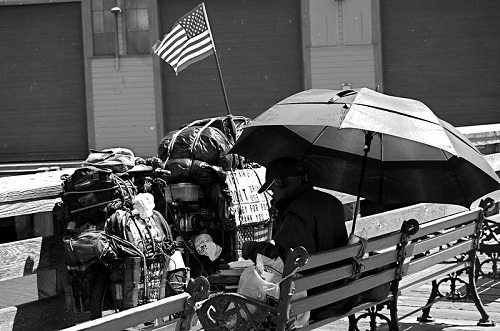
June 25, 2013; SFGov.org (City and County of San Francisco)
While San Francisco city officials are undoubtedly celebrating the drop in the homeless population from 6,455 in 2011 to 6,436 in 2013, which is largely attributed to the city government’s commitment to permanent supportive housing, the demographic questions included in the Biennial Homeless Count offer lessons for the rest of us.
For the first time ever, San Francisco collected demographic information about the sexual orientation of homeless individuals. The survey reported that almost a third (29%) of respondents self-identified as LGBTQ (lesbian, gay, bisexual, transgender, queer or questioning). This figure is most likely higher than the general population; Alfred Kinsey argued 10% of the population is gay or lesbian, and other studies have reported even smaller percentages.
It is no secret that San Francisco is an LGBTQ-friendly place, and it is not surprising the LGBTQ homeless count might be high. However, there is a deeper lesson for nonprofits across the country.
Problems migrate. Almost 40% of San Francisco’s homeless population became homeless in a city other than San Francisco. Most (24%) hail from California, but many (15%) from around the United States. Youth and those identifying as LGBTQ were more likely than other groups to have relocated to San Francisco after being homeless.
Sign up for our free newsletters
Subscribe to NPQ's newsletters to have our top stories delivered directly to your inbox.
By signing up, you agree to our privacy policy and terms of use, and to receive messages from NPQ and our partners.
Homelessness is a critical problem for LGBTQ youth. In 2012, UCLA’s Williams Institute issued a study of 354 agencies throughout the United States that found approximately 30% of the youth accessing the respondents’ housing programs identified as LGBTQ. Housing programs included emergency shelters, transitional living, independent living, permanent housing, and a host home program.
According to the Williams Institute, the top five reasons why LGBT youth are homeless are because they 1) ran away because of family rejection of sexual orientation or gender identity (46%), 2) were forced out by parents because of sexual orientation or gender identity (43%), 3) encountered physical, emotional, or sexual abuse at home (32%), 4) aged out of the foster care system (17%), and 5) experienced financial or emotional neglect from family (14%).
For LGBTQ youth, it is critical that support be available not just in San Francisco or in LGBTQ-focused organizations, but also in homes, schools, and cities across the country. Multiple studies have confirmed LGBT youth are more likely to attempt suicide, run away, and experience homelessness. Nonprofits and civic groups everywhere, regardless of their mission, can work to prevent this.
Nonprofits of all types, especially those working with youth, might ask themselves a few questions:
- Is staff culturally competent and comfortable working with LGBTQ populations?
- Is staff trained to actively prevent and/or address harassment or bullying based on sexual orientation and gender identity?
- How do you signal that your space is LGBTQ friendly?
- Do your demographic surveys of clients include information about sexual orientation and gender identity?
- Do you have relationships with LGBTQ organizations and groups that would allow for cross-referrals?
Both San Francisco and the Williams Institute’s reports remind us to focus on the invisible populations among us.—Jennifer Amanda Jones













